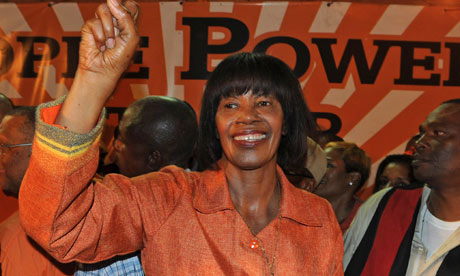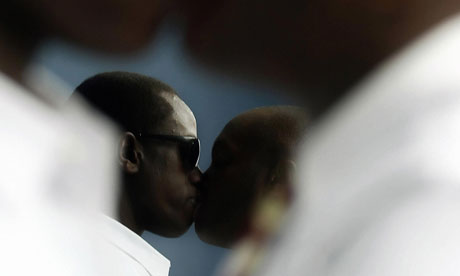viaThe Guardian by Sarah Boseley
 They are one of the world's most beleaguered gay communities, brutalised by violence, hounded by a law that makes homosexual acts a crime and driven into the shadows in a country where four in five people admit they are homophobic. But now gay people in Jamaica are cautiously optimistic that change may be in the air.
They are one of the world's most beleaguered gay communities, brutalised by violence, hounded by a law that makes homosexual acts a crime and driven into the shadows in a country where four in five people admit they are homophobic. But now gay people in Jamaica are cautiously optimistic that change may be in the air.
Maurice Tomlinson, a Jamaican law lecturer and legal adviser to the advocacy group Aids-Free World, says he is delighted by the change of mood – although it has yet to lift the sense of insecurity felt by Jamaica's gay community. Tomlinson, a prominent voice for gay rights on the island, has fled his home because of death threats that followed his marriage to his male partner in Canada after a picture was published in the Toronto Star.
"I was advised to go into hiding," said Tomlinson, in London to collect an award named after murdered Ugandan gay rights activist David Kato for his advocacy work. "I went into a safe house for about three days because my passport was with the UK high commission waiting for a visa to come here.
"Right now I'm not sure if I will be able to go back to teaching this semester."
Tomlinson says Jamaican police have told him that attitudes on the island are unfortunate but "will not change until the law changes".
Even so, he does not yet want the conscience vote on the sodomy law that the prime minister suggested during the election. "Over 80% of Jamaicans have identified as homophobic," he says. "We want more time to explain to the Jamaican people how harmful the law is."
He wants them to know that the law contributes to the spread of HIV, which has a 32% infection rate among gay men compared with 1.6% in Jamaica's general population. Fear of being attacked and murdered drives lesbian, gay, bisexual, transgender and intersex (LGBTI) people to hide their sexuality. The prevalence of HIV puts them at risk but they do not get help to stay safe. Some gay men marry in a bid to seem straight to the outside world and that puts their wives and children at risk of HIV, says Tomlinson.
Read the Rest.
[If an item is not written by an IRMA member, it should not be construed that IRMA has taken a position on the article's content, whether in support or in opposition.]
 They are one of the world's most beleaguered gay communities, brutalised by violence, hounded by a law that makes homosexual acts a crime and driven into the shadows in a country where four in five people admit they are homophobic. But now gay people in Jamaica are cautiously optimistic that change may be in the air.
They are one of the world's most beleaguered gay communities, brutalised by violence, hounded by a law that makes homosexual acts a crime and driven into the shadows in a country where four in five people admit they are homophobic. But now gay people in Jamaica are cautiously optimistic that change may be in the air.A new government has begun making noises about an end to discrimination and repealing an anti-gay law. Portia Simpson Miller, standing for election as prime minister in December, declared that "no one should be discriminated against because of their sexual orientation", and indicated she would be willing to have gay people in her cabinet. "I certainly do not pry or do not have any intention to pry into the private business of anyone," she said. She won by a landslide.
Maurice Tomlinson, a Jamaican law lecturer and legal adviser to the advocacy group Aids-Free World, says he is delighted by the change of mood – although it has yet to lift the sense of insecurity felt by Jamaica's gay community. Tomlinson, a prominent voice for gay rights on the island, has fled his home because of death threats that followed his marriage to his male partner in Canada after a picture was published in the Toronto Star.
"I was advised to go into hiding," said Tomlinson, in London to collect an award named after murdered Ugandan gay rights activist David Kato for his advocacy work. "I went into a safe house for about three days because my passport was with the UK high commission waiting for a visa to come here.
"Right now I'm not sure if I will be able to go back to teaching this semester."
Tomlinson says Jamaican police have told him that attitudes on the island are unfortunate but "will not change until the law changes".
Even so, he does not yet want the conscience vote on the sodomy law that the prime minister suggested during the election. "Over 80% of Jamaicans have identified as homophobic," he says. "We want more time to explain to the Jamaican people how harmful the law is."
He wants them to know that the law contributes to the spread of HIV, which has a 32% infection rate among gay men compared with 1.6% in Jamaica's general population. Fear of being attacked and murdered drives lesbian, gay, bisexual, transgender and intersex (LGBTI) people to hide their sexuality. The prevalence of HIV puts them at risk but they do not get help to stay safe. Some gay men marry in a bid to seem straight to the outside world and that puts their wives and children at risk of HIV, says Tomlinson.
Read the Rest.
[If an item is not written by an IRMA member, it should not be construed that IRMA has taken a position on the article's content, whether in support or in opposition.]













